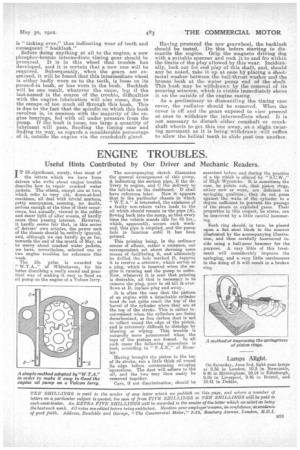ENGINE TROUBLES.
Page 43

If you've noticed an error in this article please click here to report it so we can fix it.
Useful Hints Contributed by Our Driver and Mechanic Readers.
I ISNsignificent, surely, that most of the letters which we have from drivers who write about engine trouble describe how to repair crackedwater jackets. The .others, except one or two, which refer to very old, down-at-heel machines, all deal with trivial matters, petty annoyances, seeming, no doubt, serious enough at the time of their occurrence, but actually, viewed in the colder and saner light of after events, of hardly more than passing interest. However, it hardly seems fair that, in this series ci! drivers' own articles, the power unit of the chassis should he entirely ignored, and, although we can hardly go so far, towards the end of the month of May, as be worry about cracked water jackets, we have, nevertheless, selected one or two engine troublea for reference this week.
The 15s. prize is awarded to " W.T.A.," of Whitehaven, for his letter diseribing a really sound and prac ticel way of making it easy t. flood ai oil pump on the engine of a Vulcan lorry
The accompanying sketch illustrates the general arrangement of this pump, A indicating the suction. pipe, B the delivery to engine, and C the delivery to the tell-tale on the dashboard. D ;hall
have reference later. Now it appears that in the particular chassis in which " W.T. A." is interested, the existence of a faulty non-return valve leads to the oil which should remain in the pipe (A), flowing back into the sump, so that every time the vehicle stands idle for 48 hrs., which, apparently, occurs each weekend, this pipe is emptied, and the pump fads to function until it has been primed.
This priming being, in the ordinary course of affairs, rather s, nuisance, our correspondent set about devising some means of facilitating it, and ultimately he drilled the hole marked D, tapping it to receive a setscrew, which serves as a plug, which is inserted when the engine is running and the pump in order. Now, whenever it is seen thatpriming is desirable, all that is necessary is to remove the plug, pour in oil till iti overflows at D, replace plug and away..
It is often the case that the pistons of an engine with a detachable cylinder head do not quite reach the top of the barrel of the cylinder when they are at the top of the stroke. This is rather inconvenient when the cylinders are being decarbonized, as fine carbon dust is apt to collect. round the edge of the piston, and is extremely difficult to dislodge by blowing or wiping. This trouble is naturally more pronounced when the tops of the pistons are domed. In all such cases the following procedure is best, according to " F.A.S.," of Bromley. Having brought the piston to the top of its stroke, run a little thick oil round its edge before commencing scraping -operations. The dust will adhere to the oil, and the two may then easily be removed together.
Care, if not discrimination, should he
exercised before and during the practice of a tip which is offered by of High Wycombe. It is sometimes the case, he points out, that piston rings, either new or worn, are deficient in springing qualities; they do not press against the walls of the cylinder to a degree sufficient to prevent the passage of the steam or exploded gases. Their properties in this respect, be states, can be improved by a little careful hammering.
Each ring should, in turn, be placed upon a flat steel block in the manner illustrated by the accompanying illustration, and then carefully hammered beside using a ball-pene hammer far the purpose. A very little of this treatment will considerably improve the springing, and a very little carelessness in the doing of it will result in a broken ring.
Lamps Alight
On Saturday, June 3rd, light your lamps at 9.36 in London, 10.3 in Newcastle, 9A8 in Birmingham, 10.14 in Edinburgh, 9.58. in Liverpool, 9.46 in Bristol, and 10.41 in Dublin.












































